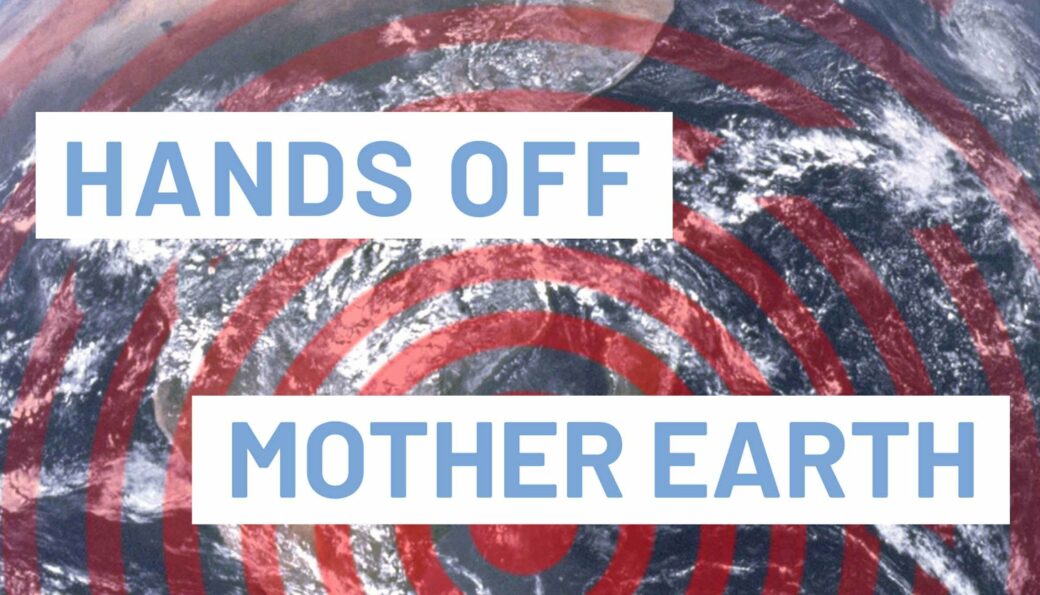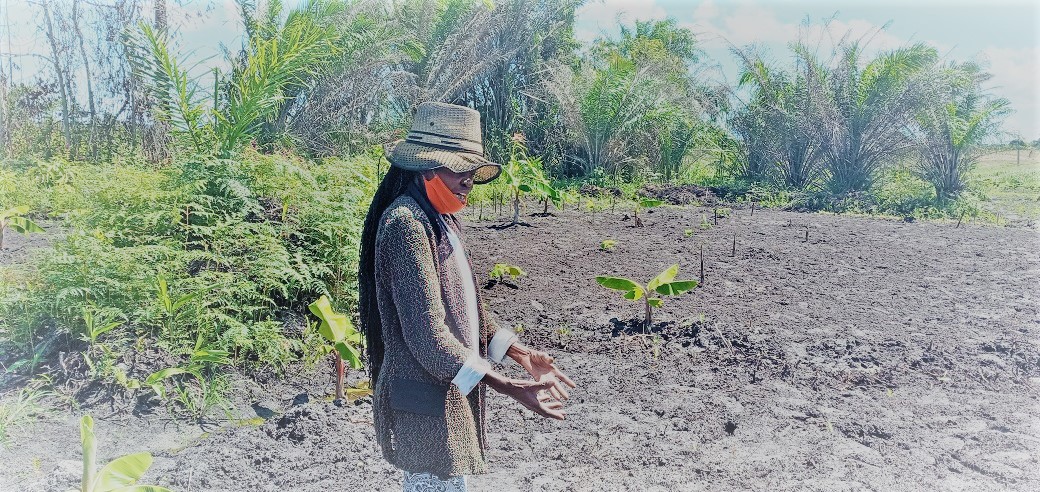Comunicado de prensa de Don’t Geoengineer Africa: Un llamamiento de alerta de las organizaciones de la sociedad civil africana

Fuente: handsoffmotherearth.org
15 de febrero de 2023-Las organizaciones de la sociedad civil que defienden la justicia climática y medioambiental piden a la Unión Africana que no haga geoingeniería en África con vistas a la Cumbre de Jefes de Estado de la Unión Africana que se celebrará pronto en Addis Abeba (Etiopía), señalando que la geoingeniería es una solución tecnológica que sólo puede servir de excusa para que África y el Norte Global sigan dependiendo de la generación de energía basada en combustibles fósiles ante la actual emergencia climática. El avance de las tecnologías de geoingeniería distrae a los países de sus compromisos de grandes recortes de emisiones, consumo responsable y entrega de la financiación climática que se les debe.
Una carta presentada el año pasado durante la Conferencia Ministerial Africana sobre Medio Ambiente (AMCEN), firmada por más de 35 OSC africanas, expresaba una profunda preocupación por las recientes propuestas para avanzar en las tecnologías de geoingeniería en África. Las tecnologías de geoingeniería suponen una grave amenaza para África, su población y el medio ambiente.
La geoingeniería se refiere a las manipulaciones e intervenciones tecnológicas a gran escala y a largo plazo en los océanos, la tierra y la atmósfera de la Tierra con el objetivo de alterar los sistemas climáticos para eludir algunos de los síntomas del cambio climático, en lugar de abordar sus causas profundas.
Continuar leyendo en inglés…
- Geoengineering technologies include for example:
-
- Spraying reflective particles into the layer above the atmosphere to create a reflective layer to act as a reflective barrier against incoming sunlight (or solar radiation) from reaching the Earth and warming her. The speculative, hypothetical and transboundary technology is modelled to be deployed for decades or centuries. (Stratospheric Aerosol Injection, also known as ‘Solar Geoengineering’)
- Dumping large volumes of micro- or macro-nutrients (like iron or urea) into the ocean changes its chemistry and aims to create an epidemic of phytoplankton. The phytoplankton is intended to die, sink and transport carbon to the bottom of the sea. (Ocean Fertilization).
- Burning of very large quantities of cultivated crops, trees or plant residues from farmlands and forests – aiming to capture the CO2 arising from the combustion process. The CO2 is then transported and stored underground, theoretically, for long-term storage (Bioenergy Carbon Capture and Storage – BECCS).
- Using extremely energy intensive and (in some cases) water-demanding processes or/and machines to capture Carbon Dioxide and inject it through newly built large scale pipeline networks, deep underground. (Direct Air Carbon Capture and Storage – DACCS)
Geoengineering technologies risk disrupting local and regional weather patterns and further imbalance the climate, with potentially catastrophic effects for Africa and other low lying regions, including water availability and food production. The adverse impacts and side effects could cause more regional and international conflicts as many technologies could have side-effects in neighboring countries or across the world.
- Humans may have to use these technologies for decades or thousands of years – where we could be locked into the cascading social, environmental and politically harmful consequences of using them.
African CSOs flagged that geoengineering for a second time had been featured on the agenda of the previously held expert meeting at AMCEN and are thus calling on the African Union to lead on the narrative that the climate emergency will not be solved by techno-fixes. During the AMCEN meeting last year, the proposed agenda on geoengineering was referred to as “Climate Altering Technologies and Measures” or “CATM”, which African CSOs noted as another attempt at normalizing geoengineering and confusing the debate on the subject while taking advantage of African policymakers before they are fully informed and engaged with a diverse range of arguments and research.
The letter regarded the insertion of this agenda item as a dangerous attempt by pro-geoengineers to use AMCEN and to exploit Africa to advance one of the most controversial technologies conceivable. CSOs and African Climate Campaigners have rejected the narrative that Africa should be at the forefront of geoengineering research, and see this as a neo-colonial effort to co-opt African countries and officials into supporting an agenda that is fundamentally against the interests of the continent.
It was cited in the letter that Geoengineering is neo-colonial and imperial and that it represents a continued effort by rich countries, corporations and elites to:
- Evade their own responsibilities for causing climate change, and their obligations to reduce their excessive consumption and dangerous climate pollution;
- Continue and expand the exploitation of Africa for fossil fuels and other resources to fuel their continued over-consumption and pollution;
- Shift the burden of climate change further to Africa as the most vulnerable continent, which has done the least to cause climate change;
- Distract Africa from its focus on climate finance, adaptation and real solutions, and to skew climate finance away from African priorities towards the priorities of rich countries and corporations;
- Turn Africa into a testing ground for the most dangerous techniques of manipulating the atmosphere, land and oceans, designed to continue and entrench current patterns of consumption, production, pollution and profit;
- Persuade Africans that these approaches are in their best interest and should become their own agenda, which they should champion.
These technologies present unacceptable levels of risk. In the case of solar geoengineering, implementation of the technology may even lock the world into a nightmare situation where the technology needs to be maintained for thousands of years despite mounting catastrophes for societies and ecosystems, since the effects of stopping may cause an even worse spike in temperatures – a situation known as ‘termination shock’.
Hundreds of global environmental governance scholars in fact conclude that solar geoengineering is ‘ungovernable’ and have launched a call for the establishment of an International Non-Use Agreement on Solar Geoengineering where Africa and Europe are encouraged to take the lead. Africa must engage with initiatives that call for the ‘non-use’ of geoengineering, and that base their assessments on an accurate scale of environmental, political and social risks and harms.
The root causes of climate change – where the Global North lifestyles and economies are excessively responsible for the extreme levels of CO2 emissions- must be addressed first and only. Africa can not be entangled in the interests and short falled responsibilities of the Global North any further or longer. Africa should continue to aspire to be a leader in sustainable development that lives in harmony with Mother Earth and does not depend on her extraction or manipulation and pollution.
This is what African Climate Campaigners and CSOs have to say:
- Kwami Kpondzo, Africa Regional Focal Point, Global Forest Coalition said:
Geoengineering is one of the false solutions pushed into Africa. Implementing it will have huge impacts on local communities and their livelihoods. It will promote more land grabbing for monoculture plantations expansion and will reinforce the carbon offsetting which will continue to legitimize the CO2 emission, thus the continuation of the climate crisis. We don’t want our continent to be cooked.
- Mfoniso Antia, Africa Technology Assessment Platform (AfriTAP) said:
Africa is not a petri dish for hubristic technological adventurism nor the dumping ground for unwanted technological mistakes. It is time to stop undermining Africa’s deep and complex traditions of indigenous innovation. Africa deserves to decide what technologies to accept or reject. Geoengineering at its best is an attempt to distract Africans from seeking real climate solutions and actions. Do not geoengineer Africa.
- Geoffrey Kamese, Bio Vision Africa (Kenya) said:
As poor countries, we are not only concerned about the global rise in temperatures, but we are also concerned about the irresponsible global accumulation of carbon and emission of other greenhouse gasses resulting from inaction because of Geoengineering.
- Bhekumuzi Dean Bhebhe, Campaigns Lead , Power Shift Africa said:
Geoengineering is an elaborate excuse fueled by a dangerous techno-utopian dream that seeks to justify the continued use of fossil fuels in Africa. Geoengineering does absolutely nothing in addressing the continent’s climate emergency and if adopted will stop Africa from leapfrogging towards a renewable and clean energy future. Geoengineering carries a large risk to the ongoing climate crisis and will only cause irreversible damage to the environment.
- Nnimmo Bassey, Director, Health of Mother Health Foundation (HOMEF) said:
Geoengineering is logically and ethically bad science. They are based on sets of misleading algorithms aimed at profits and control. No one, no matter how powerful, should be permitted to grab the planetary thermostat. Geoengineering is an unacceptable distraction to lock in current destruction production and consumption patterns. Africa cannot afford the risks that geoengineering would offload on her. Our demand is for serious adherence to real climate actions — halt fossil fuels extraction/burning, pay the climate debt and respect the rights of Mother Earth to maintain her cycles without human interference.
- Ubrei-Joe, Maimoni, Coordinator, Climate Justice and Energy Program, Friends of the Earth Africa said:
Geoengineering is another deceptive means of increasing the dispossession and grabbing of more community resources while not actually reducing emissions.
Together, African CSOs, community people and concerned researchers raise their voices to say, do not geoengineer Africa, stop the distraction and face real climate actions.










